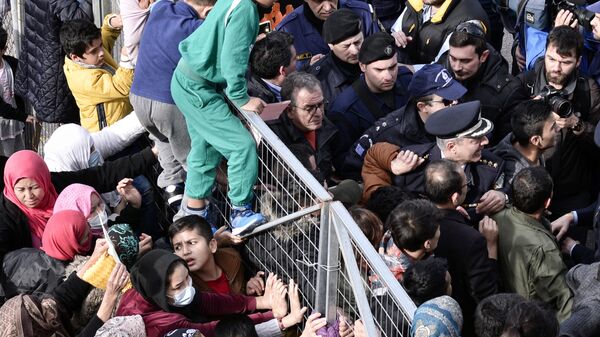The EU's so-called "hotspot" approach for irregular migrants arriving in Italy and Greece has helped to significantly improve the registration, identification and security checking of migrants, but more needs to be done as thousands of migrants are still stranded on the Greek islands after their arrival, according to a new report from the European Court of Auditors.
#refugeecrisis hotspots: auditors find a shortage of facilities for unaccompanied minors — to be urgently addressed https://t.co/vZVhgmglep pic.twitter.com/MLBDVNnd1U
— EU Court of Auditors (@EUauditors) April 25, 2017
In Greece, new arrivals have, since March 2016, no longer been allowed to leave for the mainland but instead must lodge their asylum application at the hotspots. Also, the auditors say, relocation is no longer an option, and returns are slow. As a result, there are still more migrants arriving at the hotspots than leaving, and they are seriously overcrowded.
In Italy, as migrants receive better information about relocation, more candidates have been identified, and the auditors warn that the main problem now is a shortage of pledges from member states. By September 2016, only 3,809 formal pledges had been provided by member states to Italy, against the overall commitment made to relocate 34,953 people.
1 in every 113 people are displaced. Do you know 113 people? Imagine it was your friends, your family. #RefugeeCrisis #Children pic.twitter.com/rmVHLoJIYD
— Donate4Refugees (@donate4refugees) April 23, 2017
"At the end of 2016, there was still a shortage of adequate facilities to accommodate and process unaccompanied minors in line with international standards, both in the hotspots and at the next level of reception. This issue needs to be addressed as a matter of urgency," said Hans Gustaf Wessberg, one of the two members of the European Court of Auditors responsible for the report.
Child Refugees
The auditors said that another major concern for both countries is a shortage of adequate facilities to accommodate and process unaccompanied minors, of whom there were an estimated 2,500 in Greece and more than 20,000 in Italy by the end of September 2016.
"Many unaccompanied minors have been held for long periods at the hotspots in inappropriate conditions, despite the law requiring that they be prioritized," the report said.

In January, Amnesty International criticized the way refugees were facing freezing conditions on the Greek mainland and islands.
"Refugees and migrants stranded on the islands or trapped on the mainland are woefully ill-equipped to deal with the bitter cold," said Monica Costa, Amnesty International's Migration Researcher.
"This inhumane situation is the direct result of the EU and European government pressure to seal off the Balkan route without fulfilling their relocation commitments. In addition, it results from the EU-Turkey deal which strands asylum seekers on the Greek islands in order that they remain eligible to be sent back to Turkey," she said.


